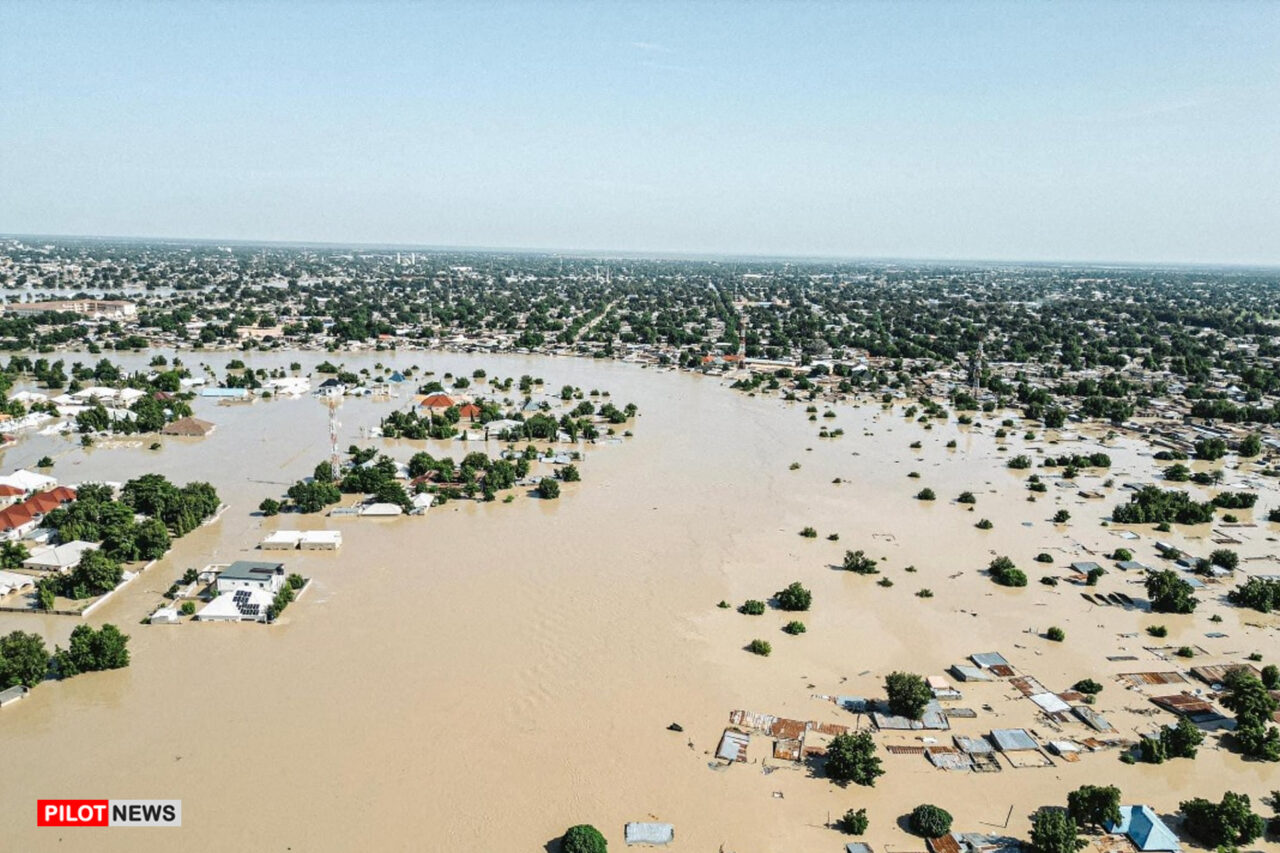By Kikiope Lekan-Oluponna
A change in policy and priorities is urgently required to avoid worsening existing flood-related vulnerabilities
There have been several incidents of flooding across Nigeria, from Mokwa in Niger State to Ogbaru in Anambra State, among others. These are climate change phenomena, and of course, human causes due largely to a carefree attitude, lack of proactive flood control infrastructure, and ineffective planning of our environmental landscape. While humanitarian and other emergency responses are being deployed, the effect of flooding may exacerbate ongoing conflicts in and around the affected areas or vulnerable communities. Attention should be paid to this impacted social effect as the phenomenon knows no borders.
One of the fundamental causes of conflict is competition over scarce resources such as land, water, and other essentials. Floods may make that possible in the affected communities. This is because displaced victims, some of whom are camped in a place or evacuated to some places, may overburden the livelihood support provided in such areas and thereby resort to rivalries, economic desperation, or stiff competition that could lead to conflict, killings, and destruction. On the other hand, such may worsen ongoing intra- and inter-community conflicts, intolerance, inequality, and tensions in some places. Armed groups can also take advantage of damaged critical infrastructure, such as energy and security.
In agrarian communities, the loss of farmland and livestock has created tensions and sparked competition over remaining resources. In states like Plateau and Taraba, where farmer-herder tensions already exist, environmental displacement is worsening the conflict. The farmer-herder conflict is also a result of natural disasters, for intensifying desertification and drought in northern Nigeria have forced Fulani herders to migrate southward into the Middle Belt, including Plateau State, in search of pasture and water. Therefore, they migrate towards the northern regions, such as the Plateau, further causing difficulties for the farmers residing in the Southern region, for the cows end up grazing on their farmland, thus causing tension and competition over land.
There is a report that about fifty-five people died in a day of renewed violence in Nigeria’s north-central Plateau State, where clashes between Muslim herders and Christian farming communities erupted, according to community leaders and a Red Cross report. The potential of conflict is almost definite, especially with the belief clashes; there are more people who practice Islam in the North, whilst there are more Christians in the South. Due to this, the ability of citizens in the South to accept people from the North due to their religion and scarcity of resources and arable land is substantially higher. There have been conflicts that have happened because of these reasons, especially in places like Plateau State. Therefore, if this continues, conflicts may continue to increase and become more treacherous, and leave terrible scars on the community. Relevant agencies and stakeholders should rise up as the natural phenomenon is becoming more heightened.
According to climate researchers, rising global temperatures have intensified rainfall patterns in West Africa, making flooding not only more frequent but also more destructive. This can be seen as a result of years of environmental neglect in Nigeria. Flooding has become one of the most devastating effects of climate change in Nigeria, growing worse over the past five years, particularly from Cameroon’s Lagdo Dam water release.
In the last five years, climate change has had severe and multifaceted impacts on the country, affecting the environment, economy, public health, and security. From relentless flooding and erosion to unbearable heat waves and loss of arable land, the environmental crisis in the country continues to escalate with no clear sign of a reduction. These effects are more intense in some regions than others, depending on geography and socio-economic factors.
Some states have seen thousands of displaced persons, entire communities flooded, and the collapse of local economies, particularly agribusiness, which many rely on for survival. According to the National Emergency Management Agency (NEMA), more than 300,000 people have been displaced in 2023 alone, as a result of recent climate-related disasters. Homes have been swept away, schools and hospitals destroyed, and countless lives lost. These floods destroyed homes, farmlands, and infrastructure, leading to food shortages, economic losses, and disease outbreaks. Flooding is now one of the most serious environmental and humanitarian challenges facing Nigeria.
The Nigerian government has taken some steps towards combating these issues, such as constructing drainage systems, erecting flood barriers, and raising awareness. However, these efforts have often been delayed or poorly executed. Without a well-coordinated and adequately funded response, these initiatives end up being a little too late. Citizens in affected areas are becoming increasingly frustrated and disillusioned. Many feel neglected and abandoned by a government that is supposed to protect them.
This frustration could soon spill over into a national issue. If vulnerable populations continue to suffer without meaningful support, they may begin to take matters into their own hands. The risk of protests, civil unrest, and even the emergence of new insurgent groups cannot be ruled out. Climate change, if not addressed, may fuel Nigeria’s next security crisis.
To prevent this from amplifying existing vulnerabilities, a shift in policy and priority is urgently needed. First, the government must adequately equip and upgrade the existing institutions to a more proactive disaster response agency that can respond quickly to emergencies. NEMA has done a lot in this regard, but more is needed in terms of scaling up interventions and sustainability.
Second, climate funding must be increased substantially. Nigeria needs to invest in sustainable infrastructure, early warning systems, and environmental education. This can be done by: risk sharing with the Private Sectors (PPP), blended finance to attract private capital, policy and regulatory support, and leveraging multilateral and green funds. Partnering with international environmental organizations and local NGOs can also bring expertise and technology that would otherwise be unavailable.
Third, affected citizens must be compensated for their losses in line with international best practices and human rights standards. This includes financial aid, relocation support based on the UN Guiding Principles on Internal Displacement, and access to new opportunities such as livelihood grants and skills training. Helping communities rebuild not only restores livelihoods but also prevents the despair and resentment that lead to instability. Establishing more IDP camps in affected areas. Compensation efforts should be transparent, inclusive, and backed by legal and institutional frameworks that protect the dignity and rights of displaced individuals. For it is important for the government to make citizens know that their complaints have been heard and that they are seen as a top priority.
Fourth, public awareness and community engagement must be central to Nigeria’s climate strategy. National policy documents such as the Nigeria Climate Change Act (2021), National Climate Change Policy (2021–2030), and the National Adaptation Strategy and Plan of Action on Climate Change (NASPA-CCN) highlight the importance of educating citizens on climate risks and involving communities in developing local adaptation solutions. I recommend a more intentional execution of these policies and monitoring and evaluation of the processes involved. Citizens need to understand the science behind climate change, their role in mitigation, and how to stay safe during climate emergencies.
Finally, Nigeria should aim to become a leader in Africa’s fight against climate change. By acting decisively and investing in solutions now, the country can avoid the worst outcomes and become a model for resilience and sustainability.
Climate change is not just an environmental issue; it is also a human, economic, and national security concern. The cost of inaction will be far greater than the cost of proactive investment. The time to act is now, before more lives are lost, more futures destroyed, and more instability created.
___________
♦ Kikiope is a 400L International Relations student of Bowen University, Iwo. She is currently an Intern at the Nigeria Institute for Peace and Conflict Resolution, Abuja. She writes via kikiopelekanoluponna@gmail.com
- From Threats to Partnership: How Diplomacy Repositioned Nigeria in Washington - January 14, 2026
- When Air Power Becomes a Christmas Performance: The Illusion of Success in Trump’s Nigerian Strike - December 28, 2025
- Burbank Marriage Unravels After Woman Allegedly Used Tracking Devices to Monitor Husband - December 27, 2025


